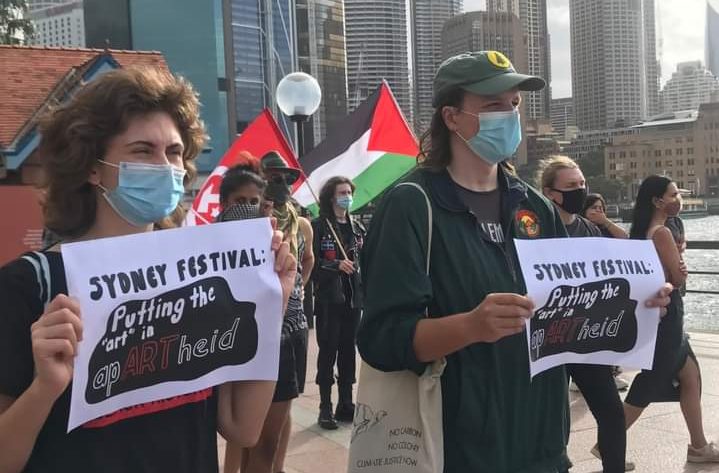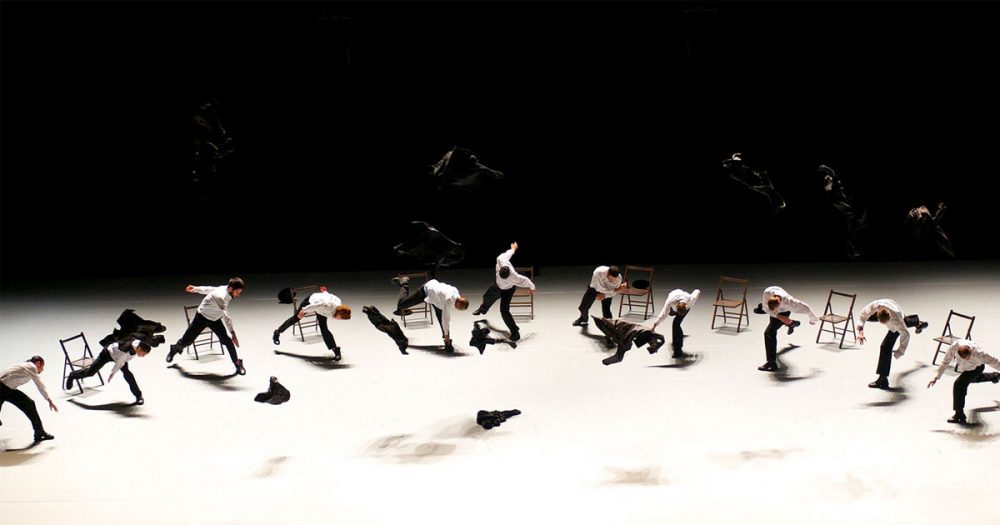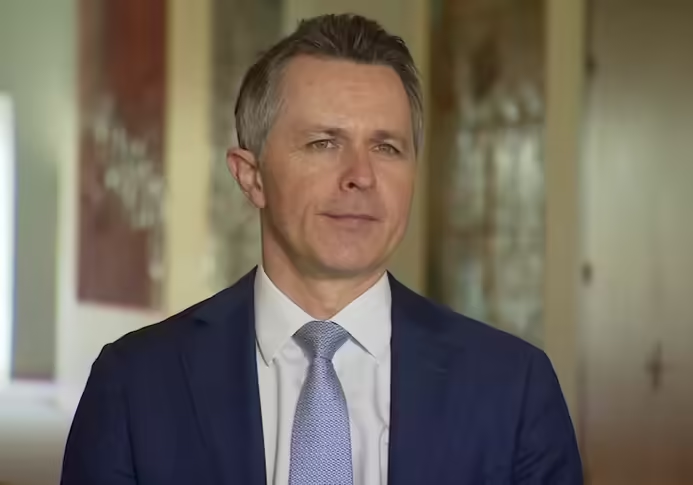Australia/Israel Review
BDS Bullying
Jan 31, 2022 | Judy Maynard

The truth about the Sydney Festival boycott

The production of “Decadance” by the Sydney Dance Company choreographed by Israeli Ohad Naharin, was supported by a small grant from the Israeli Embassy
The 2022 Sydney Festival was one of the most controversial ever, but not for artistic reasons.
At the festival management’s request, the Israeli Embassy in Australia provided $20,000 to help stage a production by the Sydney Dance Company of “Decadance”, a work that has been performed in theatres and festivals all over the world since its creation 20 years ago by renowned Israeli choreographer Ohad Naharin.
The donation was acknowledged on the festival’s website by an Israel logo alongside those of other government and community partners.
This angered local pro-Palestinian activists, who demanded the festival return the embassy’s donation and remove the logo. When the board of the Sydney Festival refused to meet their demands, the activists launched a boycott campaign, supported by the global Boycott Divestment and Sanctions (BDS) movement, calling on artists to withdraw from the festival, nonsensically branding it a “culturally unsafe” environment for Palestinian and Arab artists.
A number of artists acceded, some willingly. But as festival chairman David Kirk revealed, the only unsafe environment was caused by boycott supporters – many of whom subjected artists to blatant bullying, name-calling and moral blackmail.
On Jan. 13, Kirk told the ABC Radio National “Breakfast” audience that many of the artists were being pressured to withdraw their performances. Some were receiving an unacceptable “battering” on social media, and were as a consequence feeling “unsafe and compromised”.
The Australian newspaper reported Kirk’s comment that some artists and festival staff had been subjected to “emotionally damaging” attacks. He called on activists to behave like “decent human beings”.
In a tweet on Jan. 13 Jennine Khalik, one of the boycott organisers, said that claims that the “artists were bullied + pressured to withdraw [were] completely untrue.” This article will demonstrate otherwise.
BDS goals and tactics
The anti-Israel boycott movement likes to present itself as a non-violent resistance, encamped on the high moral ground, but its tactics in securing martyrs for the cause show otherwise. In many cases, it claims it has gained the solidarity from those it has in reality intimidated.
BDS co-founder Omar Barghouti does not prevaricate about the movement’s real goals, having declared “No Palestinian will ever accept a Jewish state in Palestine.” In a recent interview, he expressed the view that “Jewish culture is part of Arab culture,” negating any concept of self-determination for Jews after centuries of persecution.
As the BDS movement cannot physically eliminate Israel, it aims instead to “cancel” the Jewish state in whatever ways possible, trying to render it unseen and unheard. Activists campaign for the ostracisation of Israeli artists and academics internationally, and attempt to sabotage the normalisation of relations between Israelis and Palestinians, and between Israel and Arab states.
Having no success with the latter, as the Abraham Accords attest, the ire of BDS is directed at vulnerable targets – and this often does not involve simply putting one’s case and asking nicely.
In June 2018, the BDS movement claimed a campaign victory after the Argentinian national football team cancelled a friendly match scheduled in Israel. BDS activists shared widely a “quote” from star player Lionel Messi in which he supposedly said he could not play against “people who kill innocent Palestinian children. We had to cancel the game because we are humans before we are footballers.” But Messi never said any such thing.
Claudio Tapia, head of the Argentine Football Association, said the team actually had been forced to cancel due to serious threats against the players, and would try to play in Israel at a future time. The then Argentine Foreign Minister Jorge Faurie said the threats had exceeded those of Islamic State.
Jibril Rajoub, the President of the Palestinian Football Association, who claimed he had only been involved in peaceful protests against Israel, was suspended by FIFA for a year and given a hefty fine for “inciting hatred and violence.”
Another own goal for BDS was its “triumphant” campaign against the Israel-based manufacturing company Sodastream. As a result of activist bullying, the company relocated a plant in the West Bank to the Negev region, resulting in 500 Palestinians losing their jobs.
Yet the welfare of Palestinians has never been the real focus of the anti-Israel boycott movement; its ultimate desire is the elimination of Israel, as Barghouti noted.
Anti-Israel activists are always seeking new ways to “cancel” Israel. A recent example is the Australian “Do Better On Palestine” campaign, which called for media coverage that avoids “bothsiderism” – a euphemism for insisting that only the Palestinian viewpoint should be aired when news organisations report the Israel-Palestine conflict.
The same local activists who introduced that campaign to Australia are also responsible for attempting to disrupt the Sydney Festival because of the Israeli logo on its website. That logo is to them symbolic of Israel being afforded a space like any other country in international affairs and in the public consciousness, and must therefore be removed. They seek to impose on Australia their discriminatory view that Israel must be always treated as uniquely, irredeemably evil.
Denying the Ugliness
These anti-Israel stoushes always become ugly, but the boycott organisers’ strategy entailed depicting themselves as principled and noble, simply setting out their case while remaining above the fray.
Responding to festival chairman Kirk’s bullying allegations, Khalik tweeted “we have approached artists with love and empathy… and left the decision with them.”
Co-organiser, Sara Saleh, told the ABC that they “had approached their conversations with artists with care and sensitivity” and that they were trying to “build a movement and a future… on freedom, liberation, love and equality.”
But even from information available on the public record it is obvious that many of the targeted (and pro-Palestinian) artists were not feeling the love.
The Abuse of Katie Noonan

Katie Noonan (Image: Twitter)
Well-known Australian singer-songwriter Katie Noonan posted on Facebook on Jan 7:
“I decided to not get involved in this boycott, despite repeated, vigorous and quite aggressive attempts to do so. I simply said I was not contracted by Sydney Festival and was in fact contracted by SIMA [Sydney Improvised Music Association] – an awesome and very important independent cultural org [sic] I love, and I could not ask my fellow indie artists to turn down paid work after the hardest 2 years of their lives. Simple.”
She continued that she was “deeply saddened by the nature of online discussion and wish we could have respectful robust discussions without vitriol, but it does not seem possible in these difficult times.” She also revealed that she’d been called “a racist, mysogonist [sic], anti-feminist, POC [people of colour] hating, WOC [women of colour] hating, homophobic, transphobic, Palestinian hating, colonial loving, cis white, pink washing priveliged [sic] hetero c**t.”
This post then received over 1,000 comments, a mostly negative pile-on, in which Noonan was accused of being racist, Islamophobic, ignorant and a liar. Many claimed to be from disappointed fans.
A couple of the more supportive comments suggested “that a group of people who likely never even followed Katie in the first place have been told to come on over here and play stack’s [sic] on”, and “this isn’t public sentiment, this is organised mob outrage.”
At no point had Noonan suggested that any of the unacceptable messages she’d received had come from the boycott organisers, but several of them nonetheless took the opportunity to attack her as if she had – while saying she was a “racist” for making such claims.
Khalik posted a series of tweets on Jan 8:
“So Katie Noonan claims she was repeatedly and aggressively told to withdraw. There was one exchange on behalf of the campaign… Not sure why she is lying — feels like some nasty racism towards Palestinians…I’m literally stunned lmao [laughing my arse off] how do people lie through their teeth like this. She told us she wouldn’t withdraw and we said best of luck, and we’re always here to chat. but this is aGgReSsIvE [sic] the crocodile tears here are next level.”
In a tweet on Jan. 9 Khalik called Noonan’s statement “impossibly racist and untrue.”
Saleh commented on Noonan’s Facebook page:
“Katie, with all due respect, as one of the organisers I have screenshots of the conversation that took place, and your replies, which ended congenially. We would never be anything less than respectful because what we are fighting for is our freedom – underpinned by justice and love…I’m sorry you felt you needed to implicitly smear us this way…”
Another organiser, Fahad Ali, also left a comment on Noonan’s Facebook page:
“We were immensely respectful when we reached out to you and we have the screenshots of these interactions and your replies.
This post is dishonest and disingenuous. There was no reason to smear our movement and delegitimise the Palestinian struggle for freedom because you felt personally offended in some way. You have put your own ego before millions of Palestinian lives…”
To both Saleh and Ali, Noonan gave the identical response:
“pls [sic] don’t presume the boycott organising peeps [people] were the only people who contacted me.
Unfortunately that is a naive and incorrect assumption.
Unfortunately they have disingenuously shared parts of our exchange, rather than the entire exchange and that unfortunately created another incorrect narrative.
I never accused the boycott organizers of anything.
The incorrect and nasty slander has been v upsetting but I choose to rise about it and not engage.”
Yet these organisers, having called Noonan a liar and a racist, have not publicly apologised for, nor retracted, their potentially inflammatory comments, despite Noonan’s response and the lack of any basis on which to allege that she was actually attacking them.
It is also curious that they seemed oblivious to the possibility that some of their fellow travellers just might have engaged in aggressive exchanges, especially when Saleh and Ali’s comments on Noonan’s Jan. 7 post appear alongside many that are openly demeaning. Did they really not notice them?
They did, of course, but took no responsibility.
Indeed, both Saleh and Ali implicitly acknowledged the aggression – even while condemning Noonan for calling attention to it. Saleh told the ABC she “could not control the actions of passionate fans who felt strongly about the issue,” while Ali was reported in the Sydney Morning Herald as saying “We can’t control the reactions of fans or other commentators.”
Meanwhile, Ali, displaying his “immense respect”, tweeted on Jan 8:
“So my best guess of what happened with Katie Noonan is this: she saw [comedian] Judith Lucy coming thru with now something like 7k likes on FB for withdrawing from Sydney Fest and she thought “hey, I want some of that” but figured she could get even more attention if she went pro-Israel.”
Ali is correct in one respect: Noonan certainly received attention. On Jan. 12 she posted again on Facebook:
“It’s been an educational and very upsetting 5 days. I have listened and learned from various disparate points of view – informed and ill-informed, from lived on-ground experience and from the anonymity of a faceless keyboard 14,000 kms away, and I have observed behaviour I abhor and behaviour I admire.
…Twitter is a new hellhole of mentall [sic] illness and vitriol that I am quite happy to never engage with again, and I am really disappointed my name was used in am[sic] inaccurate post that was presumptive and incorrect.
…I am saddened a twitter shitshow was incited without my consent (as I posted no twitter content regarding this issue)…Sending peace/shalom/salaam and kindness to all.”
Noonan was subjected to bullying and aggression, but not just because she refused to join the boycott. It started before she made that decision. What clearly emerges is the harassment and intimidation of artists by persons probably unknown to try to force compliance with boycotts.
Victimised, even after complying with the Boycott
Musician Sarah Mary Chadwick sides strongly with the Palestinians and did withdraw from the Sydney Festival. She wrote about the experience, posting the following on her Instagram and Facebook accounts after she’d already withdrawn:
“Me and my baby Filter are getting pretty pissed off … by pressure exerted on artists to boycott festivals and events. I do not appreciate unsolicited mail from people who have zero understanding or knowledge of my financial situation or life in general. Before you contact your ‘favourite’ artist and encourage them to ‘do the right thing’ maybe consider the following.
– do you have any knowledge as to whether the artist currently has any income due to Covid?
– is it really your place to instruct other people essentially to make significant donations to causes YOU have prioritised, regardless of the validity of the cause?
– do you have any knowledge of medical or personal costs the person you are contacting is managing and do you kno (sic) if they are in fact, able to manage them at all?
is it the artists (sic) role to give up their livelihoods when the gov[ernment] continue to underfund arts? Anyway, stop telling me what to do, strangers. I have my own moral compass and I use it effectively.”
Again, Chadwick did not directly accuse the organisers of aggressive tactics. As she had already withdrawn, it was courageous of her to blow the whistle on the bullies.
Yet this “respectful” response was received from someone operating the “Boycott Sydney Festival” Instagram account:
“This post is gross, Sarah. Yes, it’s been a rough year for artists. On the other hand, Palestinians are resisting 7 decades of massacre and dispossession. You’ve made your choice, but don’t centre yourself. And don’t try to police the ways that Palestinians or their supporters choose to expand a boycott against literal violent oppression.”
Another response comes from an account which appears to belong to Matt Chun, an organiser of the boycott:
“A public post about choosing the wrong side of a picket line is weird. You have agency, as you’ve pointed out, and you’ve used it. Nobody has prevented that. But manufacturing victimhood in opposition to those who are resisting an apartheid regime is appalling.”
Boycott organisers frequently boasted of the number of artists who withdrew, and posted their photos in a gallery on their Instagram account. Yet strangely Chadwick’s photo is missing, despite her stance.
Some of the artists who were heavily critical of festival management for putting them in what they regarded as an invidious position also confirmed the bullying tactics used to encourage withdrawal.
The band Tropical F**k Storm, led by Gareth Liddiard, issued a strongly worded statement, saying the decision to accept Israel as a sponsor “would inevitably mean that hundreds of unwitting artists (who are having a rough enough time with the pandemic as it is) would become the targets of online harassment, bullying, smear campaigns, ridiculous accusations, misrepresentations and abuse from total strangers who have no idea what’s actually going on behind the scenes, what any artist’s position is or even what they’re talking about.”
Performer Jaguar Jonze joined the boycott in mid-January and released a statement criticising the festival for creating “an environment where artists and audience are put at risk and forced to endanger their careers and well-being. Because of this, the safest decision that is left – to protect myself, my team and the audience in a way the festival has decided not to – is to withdraw and cancel my performance at Sydney Festival.”
Saleh retweeted this, calling it a “principled, sensitive show of solidarity”, which is surprising as it seems to indicate a more immediate fear of harm to one’s physical “well-being” from supporters of a boycott.
Crocodile Tears
The boycott’s organisers give an impression of respectful direct dealing with the performers. Statements by the few artists who dared go public give a glimpse into the murk below.
And then there are the crocodile tears.
In response to festival chairman Kirk’s apology to artists for putting them in a position “whereby they’ve felt pressured or compromised to withdraw their acts,” Ali demanded the board divest itself of the Israeli funding to protect artists. “If [the decision to accept the funding] has had the effect that it has left artists feeling compromised and unsafe, why continue to put artists in harm’s way?”
Such impeccable logic – as if it were the funds that endangered the artists, and not the menacing BDS trolls.
In similar vein, how touching the concern expressed in Saleh’s tweet of Jan. 15: “We hope that Sydney Fest board recompenses artists for harm and loss incurred.”
Anti-Israel boycotts have never achieved anything for the Palestinian people. They have only hurt them and now, in the case of the Sydney Festival boycott, also hurt vulnerable local artists coping with the aftermath of a pandemic.
Tags: Anti-Zionism, Australia, BDS, Israel






